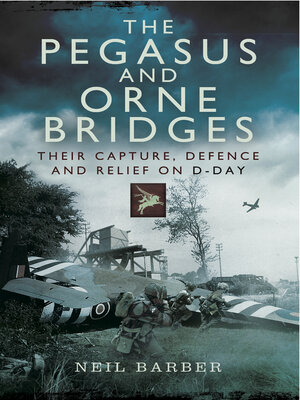
Sign up to save your library
With an OverDrive account, you can save your favorite libraries for at-a-glance information about availability. Find out more about OverDrive accounts.
Find this title in Libby, the library reading app by OverDrive.



Search for a digital library with this title
Title found at these libraries:
| Library Name | Distance |
|---|---|
| Loading... |
This WWII history chronicles a daring airborne mission that was vital to the success of Operation Tonga, D-Day, and the liberation of France.
When the British Army landed on Sword Beach in Normandy, their only exit eastward required passage across the River Orne and the Caen Canal. But the two bridges fording these waterways—the Pegasus and Orne Bridges—were heavily guarded and wired for demolition in case of a Germans retreat. Capturing these bridges would be next to impossible.
Operation Deadstick, conducted by Major John Howard and his company of Oxford and Buckinghamshire Light Infantry, was a superbly daring, brilliantly executed 'coup de main' assault. The glider-borne troops not only seized both bridges but faced a ferocious and prolonged German counterattack.
Neil Barber, a military historian and expert in British airborne operations, uses extensive personal accounts to tell this incredible story of Allied victory. Covering events and operations from Ranville in the East to Benouville in the West, Pegasus and Orne Bridges chronicles the combat of the 7th, 12th and 13th Parachute Battalions and reinforcements such as the Commandos, seaborne engineers and the Warwicks.
When the British Army landed on Sword Beach in Normandy, their only exit eastward required passage across the River Orne and the Caen Canal. But the two bridges fording these waterways—the Pegasus and Orne Bridges—were heavily guarded and wired for demolition in case of a Germans retreat. Capturing these bridges would be next to impossible.
Operation Deadstick, conducted by Major John Howard and his company of Oxford and Buckinghamshire Light Infantry, was a superbly daring, brilliantly executed 'coup de main' assault. The glider-borne troops not only seized both bridges but faced a ferocious and prolonged German counterattack.
Neil Barber, a military historian and expert in British airborne operations, uses extensive personal accounts to tell this incredible story of Allied victory. Covering events and operations from Ranville in the East to Benouville in the West, Pegasus and Orne Bridges chronicles the combat of the 7th, 12th and 13th Parachute Battalions and reinforcements such as the Commandos, seaborne engineers and the Warwicks.







